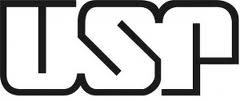 |
Café com Física |
 |
|
11 de setembro de 2013
16h30 Sala F-210 Fernando Q. Cunha Faculdade de Medicina de Ribeirão Preto - USP Failure of the immune response correlates with sepsis outcome (.odp)
Clearance of pathogens during infections depends on efficient neutrophil migration. Using animal models, we are showing a marked defect in neutrophil recruitment into infectious focus during severe sepsis, which is followed by fail of bacterial clearance and increased mortality. Similarly, neutrophils from septic patients present reduced chemotactic activity to IL-8 and LTB4 that correlated with the disease clinical severity. Investigating the mechanism involved in the process, we demonstrated that the impairment of neutrophil migration is due to activation of Toll-like receptors (TLRs) which induces the L-arginine/iNOS/NO pathway. TLR2- 4- or 9- deficient mice submitted to polymicrobial (CLP) sepsis do not present failure of neutrophil migration. Consequently, they present low bacteremia and high survival rate. Similarly, neutrophils stimulated in vitro with TLR2/4 agonists display reduced chemotactic activity to IL-8. Moreover, the neutrophils obtained from patients or experimental sepsis present increased expression of G-protein-coupled receptor kinases (GRK-2/-5). These expressions were associated with down-regulation of chemokine receptors (CXCR1/2 receptors) and consequently reduction of chemotactic activity. The expression of GRKs and down-regulation of chemokine receptors were prevented by pharmacological inhibition of iNOS (1400W)/soluble guanilate cyclase (ODQ)/PKG (KT5823) pathway. In conclusion, these results highlight the harmful role of TLRs/iNOS/NO-GC-cGMP-PKG pathway on down-regulation of chemokines receptors expression in neutrophils via induction of GRKs expression.

 |